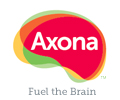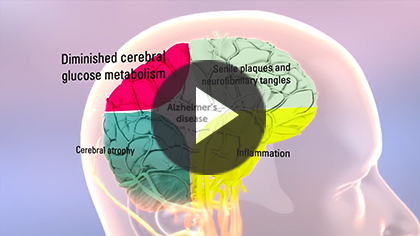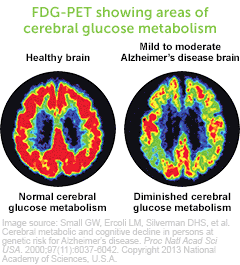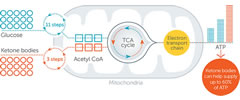Ketone bodies provide an alternative fuel source for neurons1
Ketone bodies are the brain’s natural back-up fuel2
When glucose levels are low, for example during periods of starvation or from a ketogenic diet, the liver is triggered to produce ketone bodies as a back-up fuel source.2
In adults, significantly elevated ketone body levels are usually encountered only when insulin signaling is disrupted (eg, in diabetes). Therefore, ketosis is often viewed as an abnormal condition. However, ketosis serves as an important survival function during mammalian development and when food is scarce.3
Properties of ketone bodies
Ketone body metabolism may have a number of advantages over glucose metabolism:
- Is able to readily cross blood-brain barrier1
- Improves metabolic efficiency4
- Reduces production of reactive oxygen species4
- Increases antioxidant capacity4
- May assist brain cells in clearing away debris from disease or injury3
- Can supply up to 60% of the brain’s energy needs2
Metabolism of glucose and ketone bodies in neuronal mitochondria4
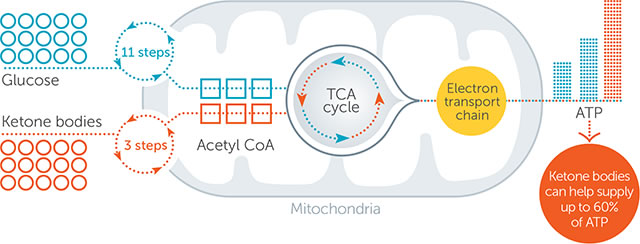
Ketone bodies do not undergo glycolysis and are able to enter the TCA cycle in fewer steps than glucose. Acetyl CoA, acetyl coenzyme A; ATP, adenosine triphosphate; TCA cycle, tricarboxylic acid cycle (also known as the citric acid cycle or Krebs cycle).
Elevating ketone body levels has a long clinical history5
- 1924
- Ketogenic diet effectively applied as a treatment for epilepsy6
- 1970
- Modifications made to ketogenic diet to include medium-chain triglycerides. All variations approximately equal in reducing seizures7,8
- 1995
- Ketogenic diet reduced seizures in patients with GLUT1 deficiency9
- 1997
- Ketogenic diet used successfully to treat pyruvate dehydrogenase deficiency10
- 2004
- Phase IIa trial demonstrates correlation between ketosis and improved Alzheimer’s Disease Assessment Scale–Cognitive subscale (ADAS–Cog) scores in APOE4(-) patients with mild to moderate Alzheimer’s disease11
- 2009
- Phase IIb trial confirms correlation between ketosis and improved ADAS–Cog scores in APOE4(-) patients with mild to moderate Alzheimer’s disease12
Medium-chain triglycerides (MCTs) as a source of ketone bodies2
- MCTs contain medium-chain fatty acids (octanoic [8:0] and decanoic [10.0] acids) and have long been known to be ketogenic
- MCTs do not require activation by coenzyme A to enter the mitochondria and are therefore able to bypass defects in metabolism
- A relatively normal choice of meals is permitted while taking MCTs
